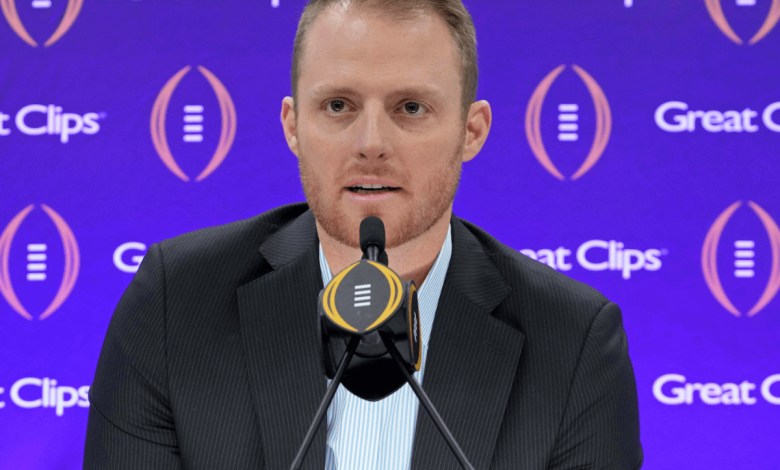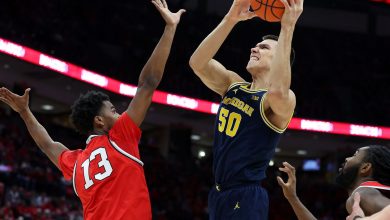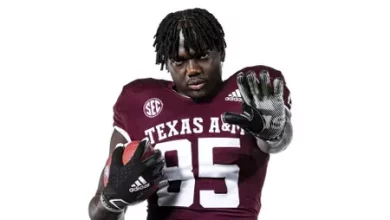Greg McElroy of ESPN explains why Tennessee football’s defense isn’t among the top ten.

The University of Tennessee Volunteers have long been a storied program in college football, with passionate fans and high expectations year after year. While the offense has shown flashes of brilliance in recent seasons, the defense has struggled to meet the lofty standards that fans and analysts alike hope for. ESPN analyst and former Alabama quarterback Greg McElroy recently offered an in-depth explanation of why Tennessee’s defense has not broken into the national top ten rankings—a critical issue as the Volunteers strive to compete at the highest level in the Southeastern Conference (SEC) and beyond.
The Context: Tennessee’s Defensive Struggles in Recent Years
Before diving into McElroy’s insights, it’s important to understand the backdrop. Tennessee’s defense has faced numerous challenges that have prevented it from becoming elite. Despite a history of strong defensive units, the Volunteers have had issues with consistency, injuries, and adapting to modern college offenses.
In recent seasons, Tennessee’s defense has often ranked in the middle of the pack in the SEC, a conference widely regarded as the toughest in college football. Their defensive rankings nationally have fluctuated, but never quite cracked the elite top ten tier. This underperformance has been a point of concern for fans and analysts eager to see the Volunteers reclaim their status as a defensive powerhouse.
Greg McElroy’s Key Points on Tennessee’s Defensive Limitations
Greg McElroy’s analysis draws on film study, statistical trends, and firsthand knowledge of SEC football. His breakdown highlights several core reasons Tennessee’s defense hasn’t reached top ten status:
1. Lack of Elite Defensive Line Play
McElroy points out that Tennessee’s defensive front lacks the consistent ability to pressure quarterbacks and stop the run at an elite level. The defensive line’s ability to penetrate opposing offensive lines and disrupt plays in the backfield is crucial for any top-tier defense.
Without a dominant pass rush, opposing quarterbacks have more time to find receivers and exploit mismatches. Similarly, if the defensive line struggles to control the line of scrimmage, the running game becomes much harder to contain. Tennessee’s defensive front has had moments of promise but has lacked the sustained dominance needed to anchor a top-ranked defense.
2. Secondary Inexperience and Depth Issues
Another factor McElroy highlights is Tennessee’s lack of depth and experience in the secondary. The cornerback and safety positions require not only athleticism but also sharp football instincts, communication, and the ability to adjust on the fly.
Injuries, transfers, and underclassmen playing significant snaps have led to inconsistent coverage and susceptibility to big plays. McElroy stresses that a top ten defense needs a reliable secondary that can lock down receivers, limit explosive plays, and support the front seven in run defense.
3. Scheme Adaptability and Coaching Transitions
According to McElroy, Tennessee has faced challenges in defensive scheme adaptability. As offenses evolve rapidly—especially in the SEC, with spread formations, RPOs (run-pass options), and versatile playmakers—defenses must be flexible and well-coached.
The Volunteers’ coaching staff has undergone changes in recent years, which has sometimes led to transitional periods where players and coaches adjust to new systems. McElroy notes that such transitions can disrupt continuity and hinder defensive execution.
4. Tackling and Fundamentals
McElroy also emphasizes the importance of fundamental tackling skills. Poor tackling technique and missed tackles lead to extended drives and bigger offensive plays. Tennessee’s defense has occasionally struggled with tackling consistency, allowing opponents to gain extra yards after contact.
A top ten defense is often characterized by its ability to finish plays decisively. Missed tackles and mental errors detract from overall defensive effectiveness.
The Impact of the SEC’s Offensive Prowess
McElroy stresses that Tennessee’s defensive challenges cannot be viewed in isolation from the broader offensive environment in the SEC. The conference is home to some of the most explosive offenses in college football, with elite quarterbacks, speedy receivers, and innovative play-calling.
Defending against such potent offenses requires a defense to operate at a high level week in and week out. Even minor lapses are quickly exploited. McElroy argues that Tennessee’s defense has often been overwhelmed by the speed and creativity of SEC offenses, which has affected their statistical rankings and national perception.
Player Development and Recruiting
Recruiting elite defensive talent is a cornerstone of building a top ten defense, and McElroy points to the importance of player development programs. While Tennessee has made strides in recruiting, especially on the defensive side, converting high school talent into college-ready starters remains a work in progress.
McElroy notes that some highly touted recruits have yet to reach their full potential, which can be attributed to multiple factors including coaching, injuries, or adjustment to the college game’s speed and complexity.
The Role of Leadership and Experience
Leadership on defense—both from coaches and veteran players—is critical in building a disciplined and resilient unit. McElroy highlights that Tennessee’s defense has at times lacked vocal, on-field leaders who can rally the team, communicate adjustments, and maintain composure in high-pressure situations.
Experience matters, especially in the secondary and linebacker groups, where split-second decisions determine the success of defensive schemes. The absence of seasoned veterans in key positions has contributed to Tennessee’s defensive inconsistency.
What Tennessee Must Do to Break into the Top Ten
Greg McElroy’s analysis isn’t just about identifying problems—it also offers a roadmap for improvement:
- Recruit and Develop Elite Defensive Linemen: To pressure quarterbacks and shut down the run effectively, Tennessee must build a dominant defensive line, capable of controlling the line of scrimmage.
- Strengthen the Secondary: Developing a deep, experienced secondary that can minimize big plays and provide reliable coverage is crucial. This includes emphasizing fundamentals and improving communication on the field.
- Enhance Tackling Fundamentals: Tackling drills and technique refinement should be a top priority in practice to reduce missed tackles and limit yards after contact.
- Stabilize Coaching and Schemes: Continuity in coaching staff and schemes will help players master defensive systems and improve execution under pressure.
- Develop Defensive Leaders: Cultivating on-field leaders will improve communication and mental toughness, especially in high-stakes SEC matchups.
Optimism for the Future
Despite these challenges, McElroy remains optimistic about Tennessee’s defensive prospects. The program’s commitment to recruiting high-level defensive talent, combined with a dedicated coaching staff and supportive fanbase, creates a foundation for future success.
Recent recruiting classes have brought in promising players, and incremental improvement is visible each season. McElroy believes that with patience and focused development, Tennessee can soon establish a defense capable of competing with the SEC’s elite and earning a top ten national ranking.
Greg McElroy’s detailed explanation of why Tennessee football’s defense hasn’t cracked the top ten offers valuable insight into the complex challenges facing the Volunteers. From talent gaps along the defensive line and secondary to coaching transitions and tackling fundamentals, multiple factors contribute to Tennessee’s defensive struggles.
However, these challenges also present clear opportunities for growth. By focusing on recruiting, player development, scheme stability, and leadership, Tennessee has the pieces to build a formidable defense that can compete at the highest level.
As the Volunteers continue their pursuit of excellence, fans and analysts alike will watch closely to see if Tennessee can turn McElroy’s analysis into a blueprint for defensive success—transforming from a good defense into a top ten powerhouse in college football.









